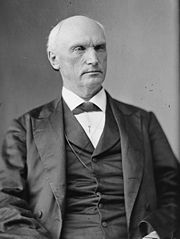
Walter Leak Steele
Encyclopedia

United States House of Representatives
The United States House of Representatives is one of the two Houses of the United States Congress, the bicameral legislature which also includes the Senate.The composition and powers of the House are established in Article One of the Constitution...
from North Carolina
North Carolina
North Carolina is a state located in the southeastern United States. The state borders South Carolina and Georgia to the south, Tennessee to the west and Virginia to the north. North Carolina contains 100 counties. Its capital is Raleigh, and its largest city is Charlotte...
between 1877 and 1881.
Born near Rockingham
Rockingham, North Carolina
Rockingham is a city in Richmond County, North Carolina, United States named after the Marquis of Rockingham. The population was 9,672 at the 2000 census. It is the county seat of Richmond County...
in Richmond County, North Carolina
Richmond County, North Carolina
-Demographics:As of the census of 2000, there were 46,564 people, 17,873 households, and 12,582 families residing in the county. The population density was 98 people per square mile . There were 19,886 housing units at an average density of 42 per square mile...
, Steele attended common schools near his home and then Randolph-Macon College
Randolph-Macon College
Randolph–Macon College is a private, co-educational liberal arts college located in Ashland, Virginia, United States, near the capital city of Richmond. Founded in 1830, the school has an enrollment of over 1,200 students...
in Ashland, Virginia
Ashland, Virginia
Originally known as Slash Cottage, Ashland is located on the Old Washington Highway U.S. Route One and the Richmond, Fredericksburg and Potomac Railroad, a busy north-south route now owned by CSX Transportation...
, Wake Forest College, and finally the University of North Carolina at Chapel Hill
University of North Carolina at Chapel Hill
The University of North Carolina at Chapel Hill is a public research university located in Chapel Hill, North Carolina, United States...
, graduating in 1844.
Steele was elected to two-years terms in the North Carolina House of Commons in 1846, 1848, 1850, and 1854; he rose to the North Carolina Senate
North Carolina Senate
The North Carolina Senate is one of the two houses of the North Carolina General Assembly.Its prerogatives and powers are similar to those of the other house, the House of Representatives. Its members do, however, represent districts that are larger than those of their colleagues in the House. The...
, serving there between 1852 and 1858, and in 1852, he was named as a trustee of the University of North Carolina at Chapel Hill, a post he held until his death.
A delegate to the 1860 Democratic National Convention
Democratic National Convention
The Democratic National Convention is a series of presidential nominating conventions held every four years since 1832 by the United States Democratic Party. They have been administered by the Democratic National Committee since the 1852 national convention...
s in Charleston
Charleston, South Carolina
Charleston is the second largest city in the U.S. state of South Carolina. It was made the county seat of Charleston County in 1901 when Charleston County was founded. The city's original name was Charles Towne in 1670, and it moved to its present location from a location on the west bank of the...
and Baltimore
Baltimore
Baltimore is the largest independent city in the United States and the largest city and cultural center of the US state of Maryland. The city is located in central Maryland along the tidal portion of the Patapsco River, an arm of the Chesapeake Bay. Baltimore is sometimes referred to as Baltimore...
, Steele chaired the 1861 state convention which passed the ordinance of secession at the beginning of the American Civil War
American Civil War
The American Civil War was a civil war fought in the United States of America. In response to the election of Abraham Lincoln as President of the United States, 11 southern slave states declared their secession from the United States and formed the Confederate States of America ; the other 25...
. Steele studied law and was admitted to the bar in 1865 and practiced law in his hometown of Rockingham.
Steele was elected to the 45th
45th United States Congress
-House of Representatives:-Leadership:-Senate:*President: William A. Wheeler *President pro tempore: Thomas W. Ferry -House of Representatives:*Speaker: Samuel J. Randall -Members:This list is arranged by chamber, then by state...
and 46th
46th United States Congress
The Forty-sixth United States Congress was a meeting of the legislative branch of the United States federal government, consisting of the United States Senate and the United States House of Representatives. It met in Washington, D.C. from March 4, 1879 to March 4, 1881, during the last two years of...
U.S. Congress, serving from March 4, 1877 to March 3, 1881. He declined to run again in 1880 and returned to cotton manufacturing and banking.
Walter L. Steele died in Baltimore, Maryland in 1891 and is buried in Leak Cemetery near Rockingham, North Carolina.

